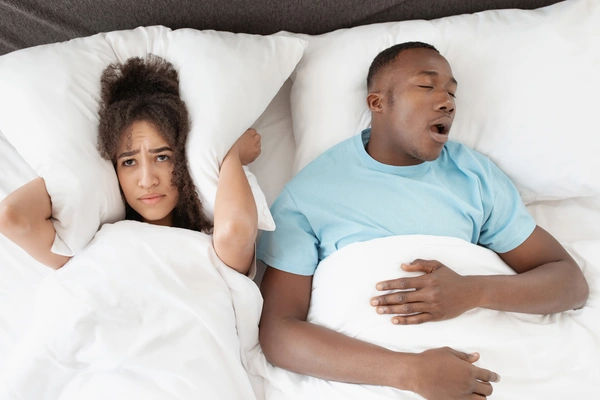Sleep Apnea: Symptoms, Causes and Treatment
Know about sleep apnea, what it is, causes, common symptoms, how it affects health & treatment options for sleep apnea.

Written by Dr. D Bhanu Prakash
Reviewed by Dr. J T Hema Pratima MBBS, Fellowship in Diabetes Mellitus
Last updated on 13th Jan, 2026

Introduction
Sleep apnea is a common but serious sleep disorder that affects millions of people worldwide. If you often feel tired despite a full night’s sleep, wake up gasping for air, or snore loudly, you might be dealing with sleep apnea.
This condition disrupts breathing during sleep, leading to poor rest and long-term health risks. The good news is that with proper awareness and treatment, sleep apnea can be managed effectively.
In this article, we’ll explore what sleep apnea is, its symptoms, causes, and available treatments to help you take control of your sleep health.
What is Sleep Apnea?
Sleep apnea is a disorder where breathing repeatedly stops and starts during sleep. These pauses can last from a few seconds to minutes and may occur multiple times per hour. When breathing stops, oxygen levels drop, forcing the brain to briefly wake you up to resume breathing, often without you even realising it.
There are three main types of sleep apnea:
1. Obstructive Sleep Apnea (OSA) – The most common type, caused by relaxed throat muscles blocking the airway.
2. Central Sleep Apnea (CSA) – Occurs when the brain fails to send proper signals to the muscles that control breathing.
3. Complex Sleep Apnea Syndrome – A combination of both OSA and CSA.
Left untreated, sleep apnea can lead to serious health problems like high blood pressure, heart disease, diabetes, and daytime fatigue.
Consult a General Practitioner for Personalised Advice
Common Symptoms of Sleep Apnea
Many people with sleep apnea don’t realise they have it because the symptoms occur during sleep. However, some common signs include:
- Loud snoring (especially in obstructive sleep apnea)
- Gasping or choking during sleep
- Waking up with a dry mouth or sore throat
- Morning headaches
- Excessive daytime sleepiness (falling asleep while working or driving)
- Difficulty concentrating or memory problems
- Mood changes, such as irritability or depression
- Frequent nighttime urination
If you or your partner notice these symptoms, it’s important to consult a doctor for proper diagnosis and treatment.
What Causes Sleep Apnea?
Sleep apnea can develop due to various factors, including:
1. Physical Factors (Obstructive Sleep Apnea)
- Excess weight – Fat deposits around the upper airway can obstruct breathing.
- Narrow airway – Some people naturally have a narrower throat or enlarged tonsils.
- Age – Muscle tone decreases with age, increasing the risk of airway collapse.
- Gender – Men are more likely to develop sleep apnea, though women’s risk increases after menopause.
2. Neurological Factors (Central Sleep Apnea)
- Heart disorders – Conditions like congestive heart failure can affect breathing control.
- Stroke or brainstem injury – These can interfere with the brain’s ability to regulate breathing.
- High altitude – Reduced oxygen levels at high elevations may trigger irregular breathing.
3. Lifestyle and Habits
- Smoking – Increases inflammation and fluid retention in the airway.
- Alcohol and sedatives – Relax throat muscles, worsening airway obstruction.
- Sleeping on your back can cause the tongue and soft tissues to block the airway.
How Sleep Apnea Affects Your Health
Untreated sleep apnea doesn’t just disrupt sleep—it can have serious long-term effects on your overall health:
- High blood pressure – Frequent oxygen drops strain the cardiovascular system.
- Heart disease & stroke – Increased risk due to irregular oxygen levels.
- Type 2 diabetes – Poor sleep affects insulin resistance.
- Weight gain – Fatigue reduces physical activity and increases cravings.
- Memory and concentration issues – Lack of deep sleep impairs brain function.
- Mood disorders – Chronic sleep deprivation can lead to anxiety and depression.
The sooner sleep apnea is diagnosed and treated, the better the chances of preventing these complications.
Treatment Options for Sleep Apnea
The right treatment depends on the type and severity of sleep apnea. Here are some common approaches:
1. Lifestyle Changes (Mild Cases)
- Weight loss – Even a 10% reduction in weight can significantly improve symptoms.
- Sleep position adjustment – Sleeping on your side instead of your back helps keep the airway open.
- Avoid alcohol and sedatives – These relax throat muscles, worsening apnea.
- Quit smoking – Reduces inflammation in the airways.
2. Medical Devices
- CPAP (Continuous Positive Airway Pressure) Machine – The most common treatment, delivering steady air pressure through a mask to keep airways open.
- Oral Appliances – Custom-fit mouthguards that reposition the jaw to prevent airway blockage.
3. Surgery (For Severe Cases)
- Tissue removal – Removing excess tissue from the throat (Uvulopalatopharyngoplasty).
- Jaw repositioning – Moving the jaw forward to enlarge the airway.
- Nerve stimulation – A device that stimulates the tongue muscle to keep the airway open.
4. Treating Underlying Conditions
- Managing heart disease, diabetes, or neurological disorders can help reduce sleep apnea symptoms.
When to See a Doctor?
If you experience:
- Loud snoring with gasping or choking
- Excessive daytime sleepiness
- Morning headaches or dry mouth
- High blood pressure or heart problems
Final Thoughts
Sleep apnea is more than just snoring—it’s a serious condition that affects your overall health. Recognising the symptoms early and seeking treatment can improve your sleep quality, energy levels, and long-term well-being.
Consult a General Practitioner for Personalised Advice
Consult a General Practitioner for Personalised Advice

Dr. Mainak Baksi
General Practitioner
13 Years • MBBS , MD (MPH)
Howrah
Mainak Baksi Clinic, Howrah
(50+ Patients)

Dr Suseela
General Physician
5 Years • MBBS
Bengaluru
Apollo Medical Center, Marathahalli, Bengaluru

Dr. Rajib Ghose
General Physician/ Internal Medicine Specialist
25 Years • MBBS
East Midnapore
VIVEKANANDA SEBA SADAN, East Midnapore

Dr. Sujay Jagatap
General Practitioner
5 Years • MBBS
Bangalore Rural
Ashwini Clinic., Bangalore Rural

Dr. Ashita Kuruvilla
General Practitioner
7 Years • MBBS
Kolkata
KVC CLINIC, Kolkata
Consult a General Practitioner for Personalised Advice

Dr. Mainak Baksi
General Practitioner
13 Years • MBBS , MD (MPH)
Howrah
Mainak Baksi Clinic, Howrah
(50+ Patients)

Dr Suseela
General Physician
5 Years • MBBS
Bengaluru
Apollo Medical Center, Marathahalli, Bengaluru

Dr. Rajib Ghose
General Physician/ Internal Medicine Specialist
25 Years • MBBS
East Midnapore
VIVEKANANDA SEBA SADAN, East Midnapore

Dr. Sujay Jagatap
General Practitioner
5 Years • MBBS
Bangalore Rural
Ashwini Clinic., Bangalore Rural

Dr. Ashita Kuruvilla
General Practitioner
7 Years • MBBS
Kolkata
KVC CLINIC, Kolkata

.webp)
.webp)